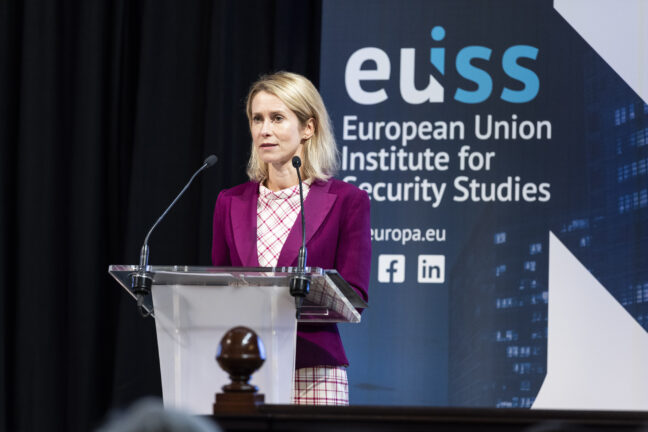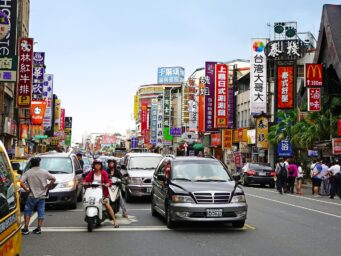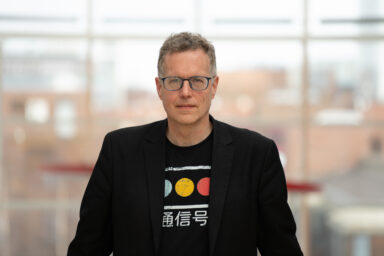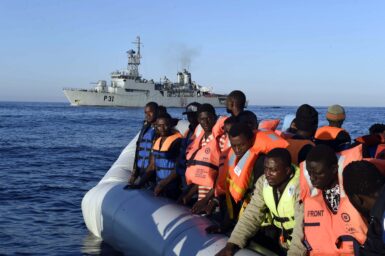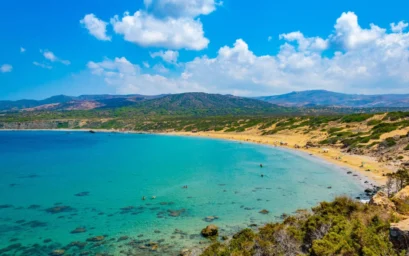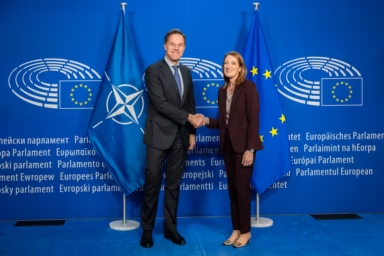Europe must choose power or irrelevance. That’s the message that EU High Representative for Foreign Affairs and Security Policy Kaja Kallas delivered this week against the backdrop of critics warning about Europe’s need to reinvent itself.
Speaking at the EU Institute for Security Studies’ (EUISS) annual conference in Brussels, Kallas framed the Union’s dilemma in stark terms: a shifting world order is taking shape without waiting for Europe, and only by building real geopolitical power can the EU secure its place at the table.
Kallas’s remarks echoed the historic words of Henry Kissinger, the former U.S. National Security Advisor and Secretary of State during the Cold War, and come just a day after Vladimir Putin and Xi Jinping reaffirmed their strategic alignment at the Shanghai Cooperation Organization summit, signaling their joint vision of a new world order. “For those who still doubt that Europe should play a geopolitical role, we have always stepped up when needed — and the same applies today,” Kallas reminded her audience, underlining Europe’s enduring claim to global relevance.
Critical materials and technology at the core of EU security
According to a Carnegie Europe report, the creation of global markets has unleashed powerful forces of “geoeconomics,” forcing nations to adapt to new technologies, production models, and communication systems. Policymakers now face these challenges with limited resources, relying on both market and non-market tools to pursue political goals.
Against this backdrop, the EU is seeking to carve out a leadership role in critical technologies and artificial intelligence. Speaking at the EUISS conference, European Commission Executive Vice-President Henna Virkkunen laid out her vision of a more resilient and autonomous Europe in fields ranging from AI and digital infrastructure to cybersecurity and data governance.
You might be interested
Draghi vs. the EU?
Former European Central Bank president Mario Draghi, currently leading the EU’s competitiveness review, has been openly critical of the Union’s global posture. At the Rimini Meeting in August, Draghi warned that Europe must reinvent itself both geopolitically and geoeconomically if it wants to survive — and reclaim global influence. For now, he argued, the EU has little to show: a marginal role in Ukraine peace talks, U.S. tariffs hitting European industries, and a China that “has made clear it does not see Europe as an equal partner, using its control over rare earths to deepen our dependence.”
“The EU is not using its geopolitical power because it is not united.” — Kaja Kallas
Kallas’s speech seemed, in part, a direct response to such criticism. “For those who doubt whether Europe should have a role on the world stage, we have always risen to the occasion when needed, and the same is true today,” she insisted. Yet Draghi’s words still resonated: “Europe stood by as Iranian nuclear sites were bombed and as the Gaza conflict escalated. These events shattered the illusion that economics alone could guarantee geopolitical power. It is no surprise, then, that skepticism about Europe is reaching new heights.”
Even on Gaza, Kallas conceded some ground, acknowledging that “the EU is not using its geopolitical power because it is not united,” reminding the 27 member states that Europe can only act as a true geopolitical force when it speaks with one voice.
For Draghi, the question is not about Europe’s founding values — democracy, peace, freedom, sovereignty, prosperity, fairness — but about whether the Union still has the ability to defend them.
Europe’s uneasy place in a geoeconomic world
As Draghi put it, Europe is “ill-equipped for a world where geoeconomics, security, and the stability of supply chains — rather than efficiency — shape international trade relations.” Still, both he and Kallas recognize that the EU has a chance to reclaim a significant role in global security. Whether Europe can seize that opportunity, however, will depend on its willingness to turn unity into geopolitical power.
